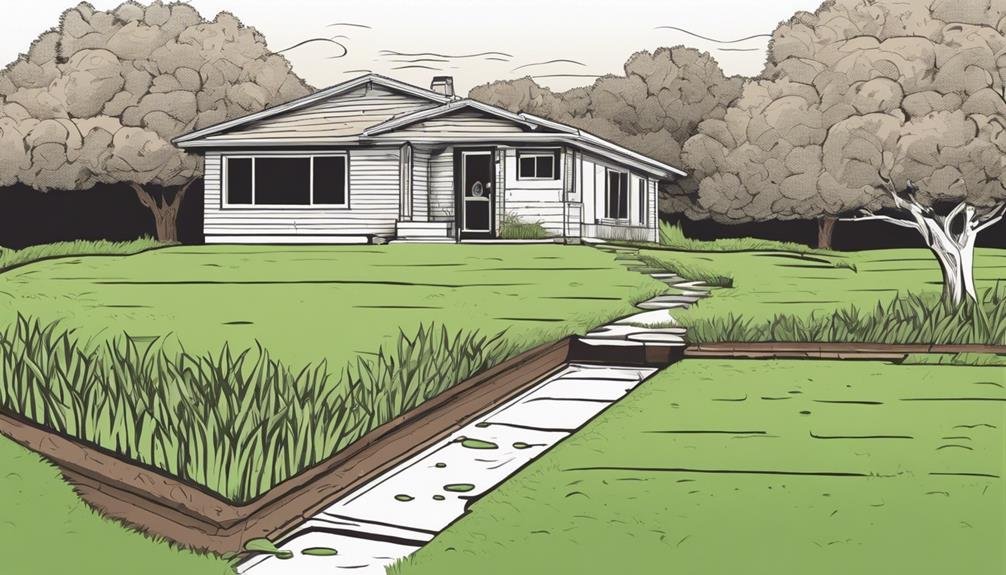When it comes to your septic system, 'An ounce of prevention is worth a pound of cure.'
You may have noticed a few warning signs that hint at a potential septic tank overflow. From a peculiar smell lingering around your property to oddly thriving green patches in your yard, these signals could be pointing towards a larger issue brewing beneath the surface.
But there's one crucial sign you shouldn't ignore, which could save you from a messy and costly situation.
Key Takeaways
- Foul odors and lush green patches signal septic tank overflow risks.
- Slow drainage in fixtures may indicate septic system issues.
- Plumbing noises like gurgling suggest underlying septic problems.
- Regular inspections, maintenance, and prompt action prevent costly septic tank overflows.
Foul Odors Around the Property

If you detect foul odors around your property, it could indicate a potential septic tank overflow. This issue is crucial as it can lead to soil contamination and pose significant health risks to you and your family. Septic tank overflows can release harmful pathogens and chemicals into the environment, contaminating the soil and potentially affecting nearby water sources.
Soil contamination from a septic tank overflow can have long-lasting effects on the environment and human health. The presence of bacteria, viruses, and other contaminants in the soil can seep into groundwater, leading to water pollution and potential health hazards if ingested.
To prevent further soil contamination and health risks, it's essential to address any signs of septic tank overflow promptly. Contacting a professional to assess and resolve the issue can help mitigate the spread of contaminants and protect both the environment and your well-being. Remember, swift action is key when dealing with potential septic tank overflows to prevent further damage and health concerns.
Slow Draining Fixtures
Slow drainage in fixtures can be an early indication of potential septic tank issues. When you notice water taking longer to drain from sinks, showers, or toilets, it could signal a problem with your septic system.
To address this, start with some maintenance tips. Regularly schedule septic tank inspections and pump-outs to prevent buildup that could cause slow drainage. Additionally, be mindful of what you're flushing down your drains to avoid clogs that may lead to sluggish draining fixtures.
Common causes of slow drainage in fixtures include a full septic tank, clogged drain pipes, or a failing drain field. If you suspect septic tank issues due to slow drainage, it's crucial to address them promptly to prevent more severe problems like backups or overflows.
Lush Green Patches in Yard

To further identify potential septic tank issues, observe any lush green patches in your yard as they may indicate an underlying problem with your septic system. These patches could be a sign of excess moisture and nutrients in the soil, possibly stemming from a septic tank overflow or leak. Here's what you can do:
- Soil analysis: Conduct a soil test to determine the cause of the lush green patches. High levels of nitrates or other nutrients in the soil may suggest septic system issues.
- Check drainage solutions: Ensure that your yard has proper drainage to prevent water from pooling near the septic tank. Poor drainage can lead to oversaturation of the soil and contribute to septic tank problems.
- Address the issue promptly: If you notice lush green patches, consider contacting a professional to inspect your septic system. Prompt action can help prevent further damage and costly repairs down the line.
Gurgling Sounds From Plumbing
Listen for gurgling sounds emanating from your plumbing fixtures as they might indicate potential issues with your septic system. Gurgling noises occur when air gets trapped in the pipes, often due to blockages or improper venting. This can lead to slow drainage, backups, or even sewage odors in your home.
To address this, start with basic plumbing maintenance. Check for clogs in your drains and clean them using appropriate tools or solutions. If the gurgling persists, it might be a sign of more severe septic tank maintenance problems.
Schedule an inspection with a professional to assess the health of your septic system. Regular maintenance, such as pumping the tank every 3-5 years and monitoring water usage, can prevent overflow and costly repairs.
Don't ignore gurgling sounds; they could be the early warning signs of a larger issue that needs prompt attention to keep your plumbing and septic system in good working order.
Conclusion
If you notice foul odors, slow draining fixtures, lush green patches in your yard, or gurgling sounds from your plumbing, these could be signs of septic tank overflow. Ignoring these signs can lead to costly repairs and potential health hazards.
For example, a homeowner in Ohio ignored these signs and ended up with a flooded yard and sewage backup in their basement, costing thousands of dollars in cleanup and repairs.
Don't wait until it's too late – act promptly to address any signs of septic tank overflow.

